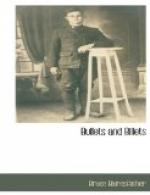We sat about at the side of the road for about half an hour, then got the order to fall in again. Stiff and weary, I left my heap of stones, took my place at the head of the section, and prepared for the next act. On we went again down the cobbled road, crossed a complicated mixture of ordinary rails and tram-lines, and struck off up a narrow road to the left, which apparently also ended in the city. It was now evening, the sky was grey and cloudy. Ypres, only half a mile away, now loomed up dark and grey against the sky-line. Shells were falling in the city, with great hollow sounding crashes. We marched on up the road.
CHAPTER XXIX
GETTING NEARER——A LUGUBRIOUS PARTY—STILL
NEARER—BLAZING YPRES—ORDERS
FOR ATTACK
[Illustration: A]
After about another twenty minutes’ march we halted again. Something or other was going on up the road in front, which prevented our moving. We stood about in the lane, and watched the shells bursting in the town. We were able to watch shells bursting closer before we had been there long. With a screeching whistle a shell shot over our heads and exploded in the field on our left. This was the signal, apparently, for shrapnel to start bursting promiscuously about the fields in all directions, which it did.
Altogether the lane was an unwholesome spot to stand about in. We were there some time, wondering when one of the bursts of shrapnel would strike the lane, but none did. Straggling, small groups of Belgian civilians were now passing down the lane, driven out no doubt from some cottage or other that until now they had managed to persist in living in. Mournful little groups would pass, wheeling their total worldly possessions on a barrow.
Suddenly we were moved on again, and as suddenly halted a few yards further on. Without a doubt, strenuous operations and complications were taking place ahead. A few of the officers collected together by a gate at the side of the lane and had a smoke and a chat. “I wonder how much longer we’re going to stick about here” some one said. “What about going into that house over there and see if there’s a fire?” He indicated a tumbled down cottage of a fair size, which stood nearly opposite us on the far side of the lane. It was almost dark by now, and the wind made it pretty cold work, standing and sitting about in the lane. Four of us crossed the roadway and entered the yard of the cottage. We knocked at the door, and asked if we might come in and sit by the fire for a bit. We asked in French, and found that it was a useless extravagance on our part, as they only spoke Flemish, and what a terrible language that is! These were Flemish people—the real goods; we hadn’t struck any before.




